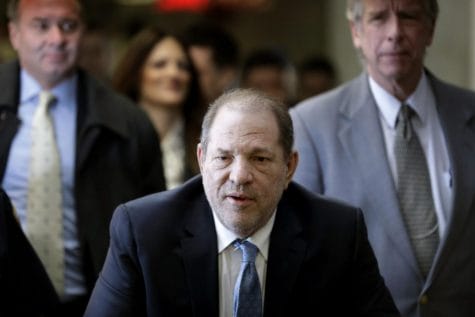What do Seth Rogen, Rick Santorum and J.K Rowling have in common?
They, and many other public figures from celebrities to senators, have spoken about “cancel culture.” Merriam-Webster defines it as a mass withdrawal of support for someone such as a celebrity to “express disapproval and exert social pressure,” but opinions on the phenomenon vary.
The newly-formed organization Unsilenced Majority opposes what they call the “woke mobs” of “cancel culture” and Rick Santorum was “savaged” by “cancel culture” for his statements on Native Americans. In the world of comedy, Seth Rogen believes that comedians shouldn’t be complaining about “cancel culture”, but confronting and accepting the jokes that may have “aged terribly.”
“Cancel culture” is a polarizing topic among the general public as well. According to a study done by the Pew Research Center, there are some who see it as taking accountability for one’s actions, others who believe it is akin to mob mentality.
But cancel culture is more than just a “woke mob” targeting public figures — it’s a newly-empowered public’s way of holding people accountable for the things they do.
“Cancelling is just holding people accountable for their behavior,” said Paul Booth, media scholar and DePaul communications professor. “It’s always ok to hold people accountable for their behavior. But I believe context is also important.”
A piece by Vox notes the term entered the mainstream at the same time as the #BlackLivesMatter and #MeToo movements, which brought about change and consequences for some public figures, such as Harvey Weinstein. Social media and hashtags allow the general public to comment on issues and spread awareness, as well as call for public figures to be held accountable for what they choose to say or do.

“Times change and what is considered ‘acceptable’ behavior changes,” Booth said. “For instance, J.K. Rowling has abhorrent views on trans people now — her ‘cancelation’ is very different from, say, someone who is accused of mere bad judgement far in the past.”
Cancel culture is not only present in the world of pop culture, it is also a hot topic in the realm of politics, as well.
“There is a large political battle going on, certainly in the U.S and in many other places as well, where there are many claims that different political opinions are being silenced,” said Samantha Close, a professor of communication studies and expertise in fandom, pop culture, and social media.
The Pew Research Center study notes that “14% of adults who had heard at least a fair amount about cancel culture” described it as censorship. In response to this “silencing,” groups like the Unsilenced Majority choose to “fight back”.
“It is a strongly felt opinion, especially for folks who lean more conservative who are saying ‘we’re being silenced, we can’t say this anymore,’” Close continued. “I don’t think that’s a very true assessment, but it’s another reason it’s making news.”
Booth notes that the term is used to describe different situations by both sides of the political spectrum.
“The left use it as a way to talk about punishing people by reducing their cultural visibility because of perceived transgressions of decent social/cultural behavior. The right use is as a term for silencing people who disagree with you,” he said in an interview over email.
While it may be described as silencing those who disagree, some “canceled” figures continue to work and appear in the public’s eye. According to Forbes, J.K Rowling is the second highest-paid author in the world and continues to publish novels for both children and adults. Rick Santorum appeared on Fox News speaking out about today’s cancel culture and “the intolerance of the left” after CNN cut ties with him for his comments on Native Americans.
Close is skeptical about the term, noting that the phrase “cancel culture” suggests that those who are canceled have serious consequences and are no longer working — but many public figures who have faced cancel culture are still working in some capacity.
If cancel culture is simply a way for “woke mobs” to silence those who they disagree with, the continued presence of “canceled” figures in the public’s eye is proof it hasn’t worked — but what we’ve come to recognize as cancel culture is more than just mobs calling for those who they disagree with to be silenced.

“I don’t think the actual effects that people decry about cancel culture are felt,” Close said. “I think folks get confused about free speech and think that free speech means that you should be able to say whatever you want to say and not have anyone argue back at you or have any consequences, and that’s not what that means. That’s what it has meant in a broadcast culture, where someone like Rowling writes her books or gets interviewed and puts her views out there and that’s it. You might read it and be angry with your friends, but she doesn’t hear any of that, and that’s no longer the case.”
With social media giving everyday people a way to chime in on the issues surrounding public figures and celebrities, the question becomes when — or if — people should call for someone to be canceled.
Close thinks it’s unwise to call for someone’s cancellation due to the negative associations with the term, which may possibly “draw ire” from others.
“But otherwise that’s part of being a responsible citizen of the world and citizen of the internet,” she added. “If you see someone doing something wrong or you see someone doing something you disagree with, you can express that disagreement, especially for public figures — that’s part of being a public figure, you are in the public.”
There’s a bigger picture — and a bigger conversation — that we should be having instead of just speaking about “cancel culture.” Instead of looking at cancel culture itself, Close suggests reframing the conversation and the problems surrounding it.
“Instead of arguing whether it’s right to cancel someone or to call for them to be canceled, say “well okay, what are they accused of doing, is that a good thing?,” she said. “Is that something we want to have happen in society?” If yes, then okay, if not, then what changes need to be made?”
Cancel culture won’t be canceled anytime soon: as more and more public figures weigh in with their opinions and social media rallies with —or against— the celebrity in the hot seat, that much is certain.
While cancel culture is making headlines as the hot topic of comedians, senators, writers, and more, we should take a good look at the larger picture. Instead of looking at cancel culture as a punishment, or as mob mentality, we should have a conversation about taking accountability, about what needs to change in the world around us, and what must be done to get us there.
"Opinion" - Google News
June 01, 2021 at 06:08AM
https://ift.tt/3p6S9BU
OPINION: Cancel culture is more than mob mentality - The Depaulia
"Opinion" - Google News
https://ift.tt/2FkSo6m
Shoes Man Tutorial
Pos News Update
Meme Update
Korean Entertainment News
Japan News Update
No comments:
Post a Comment